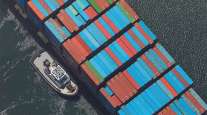Staff Reporter
Buttigieg, Shipping Stakeholders Discuss Red Sea Tensions

[Stay on top of transportation news: Get TTNews in your inbox.]
Concerned about Houthi rebel attacks against commercial vessels, U.S. Transportation Secretary Pete Buttigieg held two private meetings recently with stakeholders to discuss shipping, regional navigation and supply chain issues in the Red Sea and Gulf of Aden.
Buttigieg reinforced the importance about the Biden administration’s focus on the safety of U.S. mariners during a Feb. 7 meeting with unidentified “stakeholders from across the U.S. supply chain,” according to a U.S. Department of Transportation notice.
Buttigieg addressed “how prolonged rerouting around the Red Sea will impact supply chains, businesses and consumers” in a U.S. government strategy meeting to protect navigation and “ensure resilient global supply chains by responding decisively to Houthi rebels’ escalating attacks against commercial vessels.”
DOT noted it has kept in frequent contact with U.S.-flagged carriers, merchant mariners, labor organizations, port officials, retailers and other supply chain stakeholders about ongoing events in the region.
Unlawful and reckless Houthi attacks on the Red Sea are putting our people and our economy at risk. I spoke with representatives of our mariners and the shipping sector to discuss our ongoing coordination to address disruptions. The safety of our mariners is our top priority. — Secretary Pete Buttigieg (@SecretaryPete) February 8, 2024
Participants predicted any bottlenecks that arise will be less severe than the pandemic due to lessons learned and better coordination between the private sector and government.
“Shippers shared how they are responding to longer travel times around the Cape of Good Hope. West Coast ports shared that they are not seeing a surge in freight,” DOT stated.
Buttigieg also spoke about how DOT is on the lookout for supply chain bottlenecks that may arise using data from its Freight Logistics Optimization Works data portal in which users can upload information for analysis.
How does hydrogen fuel cell technology fit into freight transportation? Find out with Parker Meeks, the CEO of Hyzon, a company that designs and manufactures fuel cell technology for heavy-duty transport applications. Tune in above or by going to RoadSigns.ttnews.com.
FLOW, under the Bureau of Transportation Statistics, was launched in 2022 in response to pandemic supply chain problems as a digital tool giving companies information on the condition of a node or region in the supply chain so goods can be moved more quickly and less costly. The program collects purchase order information from importers as well as logistics supply/demand and throughput data from participants such as cargo owners, ocean carriers, ports and terminals. BTS groups aggregates data that can be used in daily updates of current conditions within the overall U.S. logistics network.
“Because demand data is shared in advance of when respective logistics services would be required, supply-side optimizations such as modifying supply capacity levels, service level mixes, and service expectations can be made by participants in a more proactive and responsive manner. This in turn can help the industry mitigate bottlenecks and service-level volatility,” the DOT notes.
On Feb. 5, Buttigieg and DOT officials met with maritime labor organizations and U.S.-flagged shipping companies to discuss the situation.
Want more news? Listen to today's daily briefing above or go here for more info
A DOT readout notice about the meeting said Buttigieg told participants the Maritime Administration is monitoring shipping impacts on U.S.-flag vessels and mariners, while working with the U.S. Transportation Command, the Department of Defense and Federal Maritime Commission.
“U.S. carriers — which included participants in the Maritime Security Program, Tanker Security Program and Cable Security Fleet — voiced that the safety of their crews remains their priority. Industry participants stated that communication and support from the U.S. government regarding the situation has been strong,” DOT stated. “Labor organizations expressed that communication and information is key for mariners during security situations like this. Participants expressed appreciation for the Maritime Administration for its continued advocacy for U.S.-flag carriers.”





